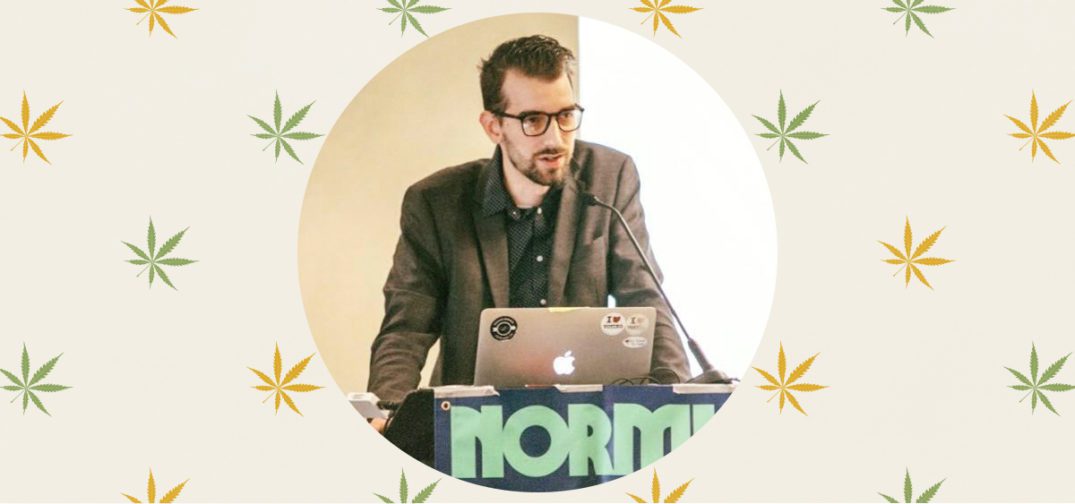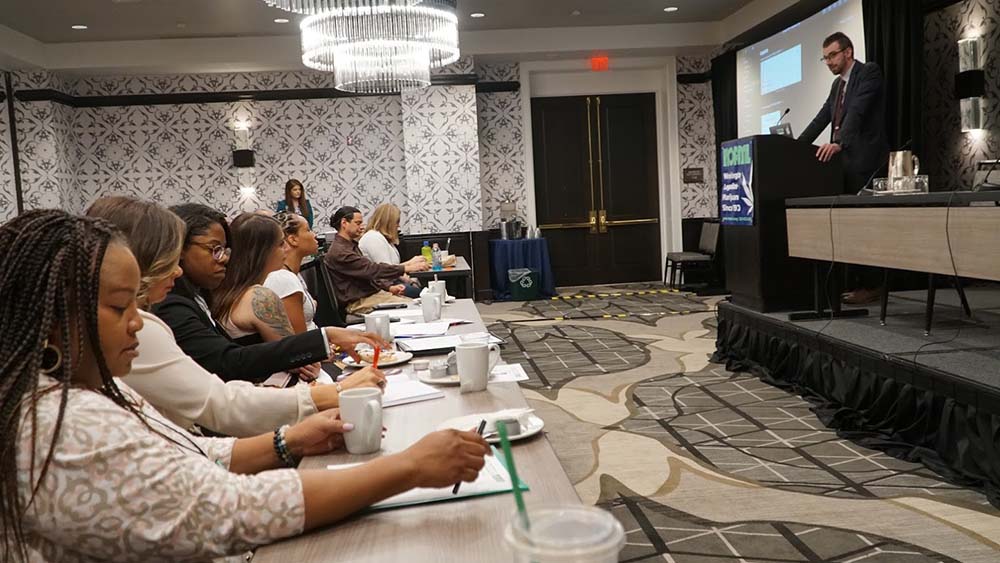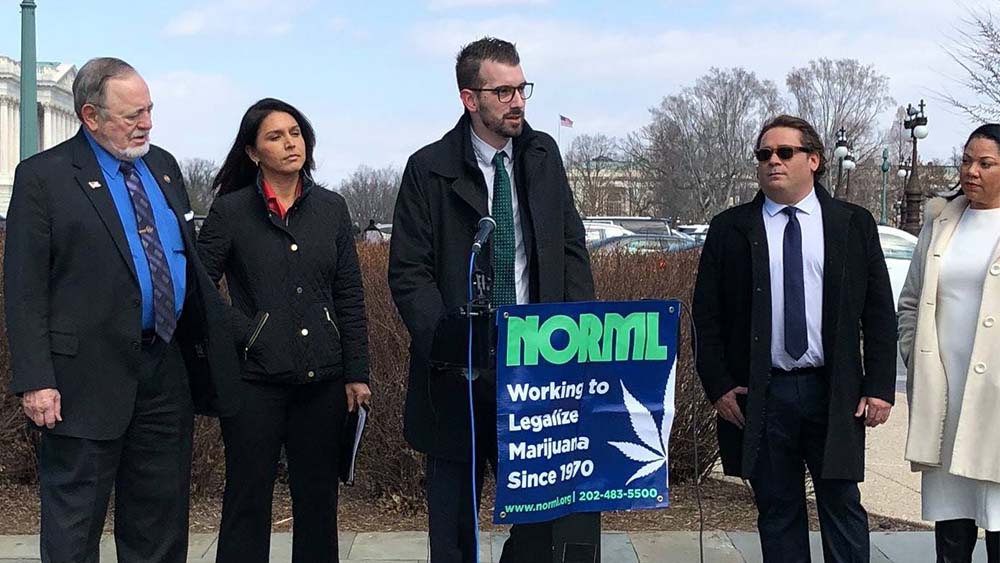The National Organization for the Reform of Marijuana Laws (NORML) was founded in 1970 by Keith Stroup. Stroup was working with Ralph Nader when the politician was focused on guaranteeing consumer protection. In this work, Stroup realized that he wasn’t protected by the government as a cannabis consumer — there was no entity ensuring cannabis was safe for consumption. He tracked this lack of oversight back to prohibition and in response, he founded the Marijuana Consumers Lobby, a grassroots organization that evolved into NORML. The national NORML branch is now led by Executive Director Erik Altieri, who spoke with us about how he got involved with cannabis policy, the structure of the organization, and what he’s looking forward to in cannabis policy this year.
Erik stepped into activism after moving to Washington D.C. to attend American University. He enjoyed cannabis socially and in his free time went to anti-Iraq war rallies. In the early 00s, he heard about a NORML rally in Philadelphia from an old friend and was interested in their goal of ending cannabis prohibition. As a young activist, Altieri opposed the unjust war on drugs, which has targeted primarily Black and Brown communities, so he reached out to NORML. The organization’s HQ was in DC and soon after that contact, he started an internship. Fifteen years later, Erik had served as a full-time staffer in communications and federal lobbying before stepping up to Executive Director. In this role, he continues his work on the Hill to end the unjust persecution of cannabis consumers through advocacy.
“We focus heavily on the core goal that we want to end prohibition so no marijuana consumer is treated as a criminal or a second class citizen in society,” Erik told Ganjapreneur. “They want access to a product that is safe, reliable, and convenient to purchase. And they want to see not only prohibition end, but us grapple with rectifying the negative impacts that prohibition has had on society, and also making sure that it’s not just once you legalize, it’s over. Still in legal states now, we have to deal with issues of employment and child protective services and things like that. That’s where we go as legalization spreads to more states and that I think makes NORML unique and NORML valuable.”
There are over 150 local chapters underneath the national branch. Headquarters educates chapter leaders about how to advocate for their own communities even if they don’t have experience in lobbying or policy work. They spend a lot of time with these volunteers to equip them with the science, studies, and polling data that is essential when advocating at a local level. The national branch hosts a weekly call with all chapters covering topics like how to organize a lobby day, run a non-profit, host fundraisers, and inspire people to get involved. “It was always primarily focused at advocating for a consumer and doing it through a grassroots movement that empowers everyday Americans to engage in the political process,” said Erik.
Policymakers at any level will respond to a mountain of calls from their constituents quicker than calls from a national non-profit organization. Erik asserted that the most effective advocate comes from the community they’re advocating for, and because of this, local chapters are essential to NORML’s success. The local push is one very important prong of their work — the other is lobbying for federal descheduling, safe banking, and the end of prohibition.
NORML’s national offices lobby for consumer-focused cannabis policy at the federal level. When Erik first started with NORML, only a few lawmakers would take their calls — the concept of cannabis legalization was sometimes even a joke in a political conversation. Since then, Erik has watched the conversation shift from “Should we legalize cannabis?” to “How do we legalize cannabis?” and he sees that as one small victory on the road to ending prohibition. And each step towards that goal is something that Erik always celebrates, but he wants to clear up how the industry, media, and consumers speak about federal legalization.
“It’s important to note that federal legalization is a bit of a misnomer, and it gets used constantly. Especially by the media. There’s never going to be such a thing as federal legalization in a way that Congress would pass a bill and now it’s legal in all 50 states. For good or for ill, that’s not how our federalist system works in this country. What the end of federal prohibition will look like is a lot like the end of alcohol prohibition, which was largely the government repealed their prohibition, they put some structures in place for oversight regulation, taxation, that kind of thing. But it didn’t force any state to legalize alcohol if they chose to maintain a prohibition. The same will happen when we deschedule marijuana. But it does remove a ton of the obstacles that you’re seeing in a lot of states where people are still hesitant to pass something that will violate federal law.”
The end of federal cannabis prohibition seems more possible than ever, but working with lawmakers on the Hill can be slow and frustrating. This work requires patience and a piecemeal plan leading toward long-term goals. Their multi-pronged approach to cannabis legalization has built a swell of political support, and this support is essential as NORML is one of the few consumer-driven cannabis lobbyist groups at a table of corporate lobbyists. Corporate lobbyists don’t have the same interest in causes like expungement and equity licensing that are important to polled cannabis consumers — NORML fills the gap left by corporations.
They have done a lot of work with Rep. Jerry Nadler (D-NY), the lead sponsor of the MORE Act, and have also worked closely with Democratic Senators Booker and Schumer on their attempts to introduce prohibition-ending policy. More recently, they have been building Republican allies like South Carolina Rep. Nancy Mace and Ohio Rep. Dave Joyce, who have made efforts toward descheduling. Descheduling would open up many opportunities for the plant, such as access to banking, the ability to research, taxes, and veteran access through the VA. But getting majority support won’t happen overnight.
That is why supporting small bills on the road to descheduling is essential to NORML’s mission. Right now, there is a lot of focus on the SAFE Banking Act. If passed, business operations would be safer and entrepreneurs would have access to traditional capital. Getting a vote through each branch would also provide an updated whip count of cannabis supporters, a beneficial toll for moving forward. Things are moving faster than ever for cannabis legalization advocates. “It’s a rate of progress that is unprecedented, not just for marijuana but for most political social issues,” Erik said.
NORML has come a long way from Erik’s early days when only a couple of lawmakers would work with the non-profit. He is proud of how they have been able to pivot from winning by ballot measure to legalizing legislatively in the last few years. Marijuana has notable momentum with the Senate Majority Leader introducing their own bill, 90% of the Democratic caucus sponsoring the MORE Act, and the numerous other legalization bills this year. What was once a fringe issue has gained support at every level of government, and a lot of these accomplishments are thanks to everyday Americans doing hard work at the local level.
Visit NORML.org and sign up for the email newsletter for calls to action and policy news, or check out one of the many local chapters.
End


